Where: As the postcard says, we're looking across Statue Square towards the original Prince's Building (the building on the left).
Who: The only living person in the photo is outnumbered by the statues that gave the square its name.
Over on the left is the grand cupola that was in the centre of the square, and housed a statue of Queen Victoria [1]. The cupola is long gone but you can still see the statue, now living in Victoria Park [2].
Another statue is this one of King Edward VII, standing on a simpler plinth:
When: We know the King Edward VII statue was unveiled in 1907, so the photo was taken after that.
| Like photos of old Hong Kong? I'll be giving a talk on 24th April, showing a bunch of my favourite old photos, and telling their stories. Please click here for details. |
Another clue is the faint, white line running along the hillside at the top-left corner of the picture:
That's Lugard Road, and it's the only structure from this photo that's still standing today. The road was built in two phases [3]. The first part was built in 1913-14, running from near the Peak Tram Terminus to just past the Bishop's Lodge. The section in the photo above was part of that, so the photo should be later than 1914.
The second phase took place during 1919-21. It extended the road to the junction with Harlech Road, completing the circuit around the Peak. Was that already finished when this photo was taken?
If you look up from the King Edward statue there's a white line at the very top of the picture. That could possibly be part of the road's second phase, but it's not clear enough to be sure.
Down from the Peak there's this cluster of buildings in mid-levels:
Do any of them help date the photo?
The last clue I can see is what's missing. In 1923 the HSBC's war memorial (a statue of 'Fame' [4]), and a statue of Sir Henry May were added to the square. We'd be able to see them from this viewpoint, so I believe the photo was taken before 1923.
I'll guess 1920 as the year this photo was taken, but please leave a comment below if you see any other evidence for or against.
What: Down in the right corner, there's what look like a stack of barrels and some sort of wagon:
Any ideas what they were used for?
Regards, David
Trivia: The original photos were black & white, but when printed as postcards they had several colours added to liven them up. Nothing fancy - just a few colours to choose from, and not always painted on very accurately:
The underlying photo is still clear to see though.
When I scan this type of postcard there's not as much detail available as there is with a photograph. But there is a lot more detail than we can get from a modern colour postcard. With a modern postcard, the coloured dots are visible at even a low level of zoom.
Does anyone know how these old postcards were printed, so they kept the detail?
References:
- Queen Victoria's statue in Statue Square
- Queen Victoria's statue today
- Construction of Lugard Road
- 'Fame' statue, the HSBC's war memorial
Reference: NA002
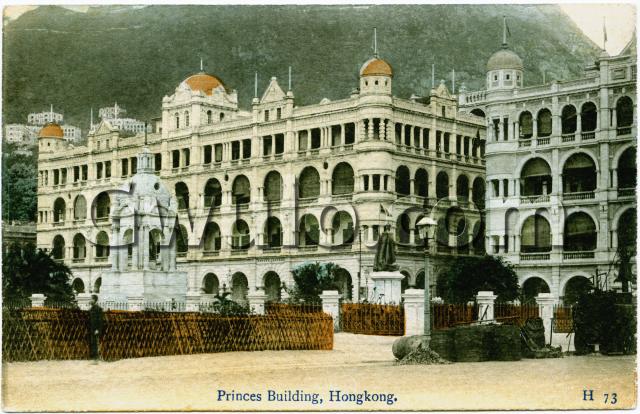
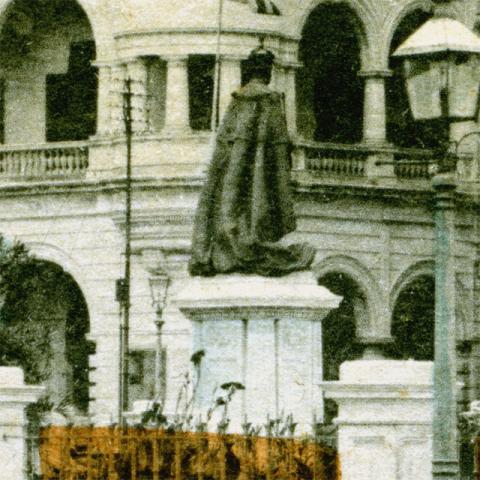
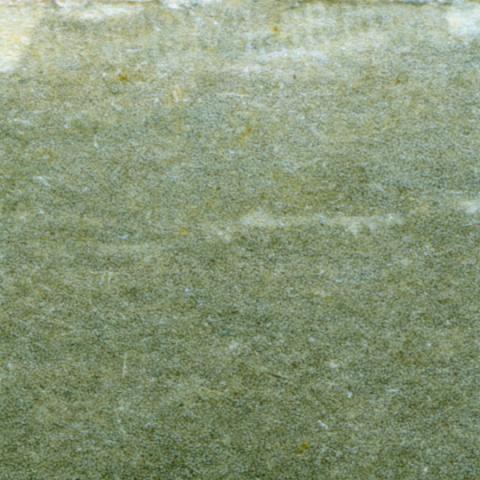
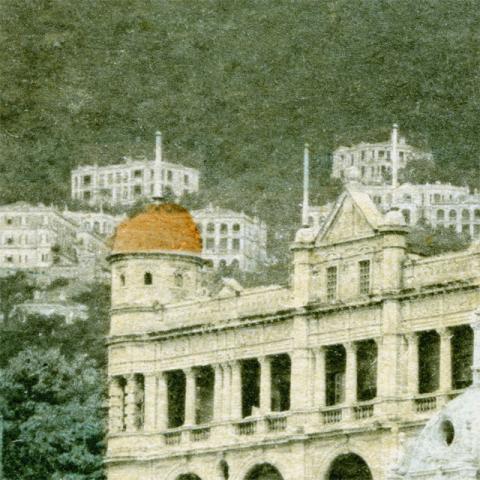
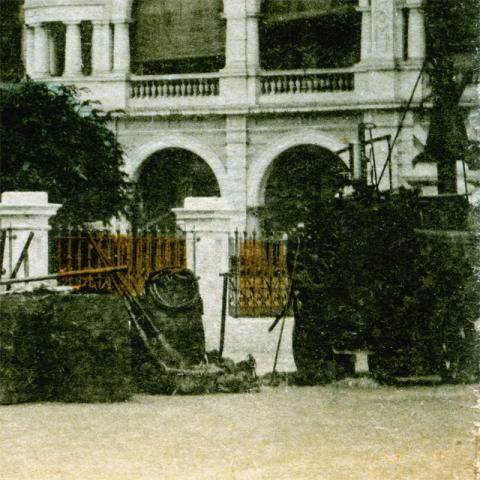
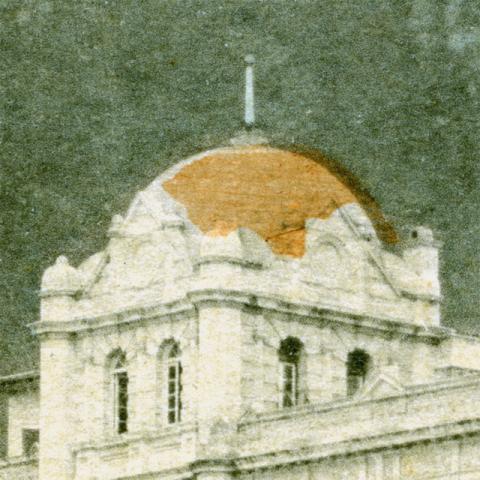
Comments
Barrels
E-mail from Ian:
I reckon that the odd machine together with the barrels etc are mostly for heating and pumping tar for use in asphalting roads.
Thanks Ian, that sounds likely.
Regards, David
Unsightly Government Land and the Tar Boilers
May not be connected with the postcard but an interesting read of events in December 1909. See here
Re: King Edward VII Statue
Facing directly opposite the statue of King Edward VII is the statue of Queen Alexandra which unfortunately is covered by the chimney of the tar boiler. However, the plinth can be seen.
From the angle shown, I am not too sure if the statue of "Fame" would be visible in the postcard.
Tar & fame
Thanks Moddsey, lots of interesting stuff in that document you've linked to. I've made a Place for the temporary buildings to gather any more information & photos:
http://gwulo.com/node/15651
You're right about the Fame statue too. Looking at where the statue of Queen Alexandra (erected 1909) is, Fame's location would have been out of sight to the right.
Regards, David
Re: King Edward VII Statue
Chinese Wikipedia says that the statues of King Edward VII and Queen Alexandra were recovered from Japan after World War Two, and then shipped back to the UK. Is there any truth in this?
Re: Statues
The HSBC lions, the statues of Queen Victoria and Sir Thomas Jackson were recovered from Japan. The China Mail dated 12 March 1947 confirms this.
1946 Statue Square
[img_assist|nid=15652|title=|desc=|link=node|align=|width=510|height=303]
[img_assist|nid=3610|title=|desc=|link=node|align=|width=510|height=353]
Re: "Fame" Statue
Looking at the 1930s photos of the "Fame" Statue, it appears that the statue was relocated westwards a bit before the completion of the 3rd generation HSBC Building.
re: statues
this 1947 photo from life shows Jackson's statue presumably reinstalled, the lettering appears blacked out http://www.gstatic.com/hostedimg/7dac8b17d14ef6cc_large
photos of unveiling in 1906 here and blog about it here: http://www.thesilverbowl.com/images/Jackson-statue/Jackson-Statue-Photo…
http://sharonoddiebrown.blogspot.com/2011/02/tj-and-story-of-his-statue…
She says the statue was found in Kawasaki Shipyard
Cupola of Queen Victoria's Statue
Sunday Herald 19 September 1948
It was announced that the pedestal and cupola of Queen Victoria's Statue were to be removed to improve traffic flow.
Statues located in Japan after the war
The newspapers of the day say the statues of Queen Victoria and perhaps Sir Thomas Jackson (man in a frock coat) as well as the HSBC lions were discovered in the Osaka Army Arsenal. See here